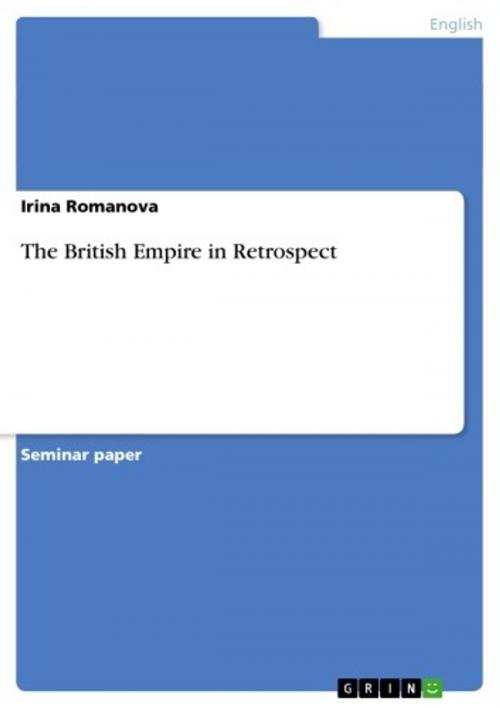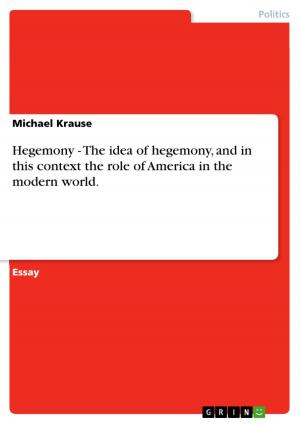The British Empire in Retrospect
Nonfiction, Reference & Language, Study Aids, ESL, Foreign Languages| Author: | Irina Romanova | ISBN: | 9783638359740 |
| Publisher: | GRIN Publishing | Publication: | March 22, 2005 |
| Imprint: | GRIN Publishing | Language: | English |
| Author: | Irina Romanova |
| ISBN: | 9783638359740 |
| Publisher: | GRIN Publishing |
| Publication: | March 22, 2005 |
| Imprint: | GRIN Publishing |
| Language: | English |
Seminar paper from the year 2004 in the subject English Language and Literature Studies - Culture and Applied Geography, grade: 1,7, University of Paderborn, course: Understanding British Business Culture, 22 entries in the bibliography, language: English, abstract: Reasons for building the Empire The British Empire was the first genuinely global empire, an empire that ranged, at times, from the American colonies in the West, Australia and New Zealand in the East, Canada and her dominions in the North and huge chunks of Africa in the South, including Egypt and Rhodesia. The history of the British Empire can be divided into two parts. The First Empire, which arose in the 17th century, consisted of North America and the Caribbean and was settled and colonised by British immigrants. This empire basically died with the American Revolution in 1776. The Second Empire arose as the first was dying and was founded primarily for the purpose of foreign trade and consisted of countries in the Pacific, in Africa, and India. In the 20th century, the British Empire practically dissolved and finally replaced by the Commonwealth. The first question to ask is why did the British feel the need to expand overseas? One of the main reasons was an economic one and was similar to motives that drove Spain and other European powers to expand their holdings: it was the desire for profitable trade, plunder and enrichment. The overseas expansion, apart from the interest of the City of London, was backed by other important interest groups: manufacturers who needed a vent for their surplus products, export merchants who handled their goods, and import merchants and their associates who dealt with the re-export trades. Expansion abroad also conferred indirect benefits on the home government, which gained from enlarged customer revenues, on the landed interest, which in consequence enjoyed favourable tax treatment, and on investors in national debt, whose returns rose when borrowing and interest rates increased. Therefore, the growth of the British Empire was due in large part to the ongoing competition for resources and markets that existed over a period of centuries between England and her continental rivals, Spain, France, and Holland.
Seminar paper from the year 2004 in the subject English Language and Literature Studies - Culture and Applied Geography, grade: 1,7, University of Paderborn, course: Understanding British Business Culture, 22 entries in the bibliography, language: English, abstract: Reasons for building the Empire The British Empire was the first genuinely global empire, an empire that ranged, at times, from the American colonies in the West, Australia and New Zealand in the East, Canada and her dominions in the North and huge chunks of Africa in the South, including Egypt and Rhodesia. The history of the British Empire can be divided into two parts. The First Empire, which arose in the 17th century, consisted of North America and the Caribbean and was settled and colonised by British immigrants. This empire basically died with the American Revolution in 1776. The Second Empire arose as the first was dying and was founded primarily for the purpose of foreign trade and consisted of countries in the Pacific, in Africa, and India. In the 20th century, the British Empire practically dissolved and finally replaced by the Commonwealth. The first question to ask is why did the British feel the need to expand overseas? One of the main reasons was an economic one and was similar to motives that drove Spain and other European powers to expand their holdings: it was the desire for profitable trade, plunder and enrichment. The overseas expansion, apart from the interest of the City of London, was backed by other important interest groups: manufacturers who needed a vent for their surplus products, export merchants who handled their goods, and import merchants and their associates who dealt with the re-export trades. Expansion abroad also conferred indirect benefits on the home government, which gained from enlarged customer revenues, on the landed interest, which in consequence enjoyed favourable tax treatment, and on investors in national debt, whose returns rose when borrowing and interest rates increased. Therefore, the growth of the British Empire was due in large part to the ongoing competition for resources and markets that existed over a period of centuries between England and her continental rivals, Spain, France, and Holland.















